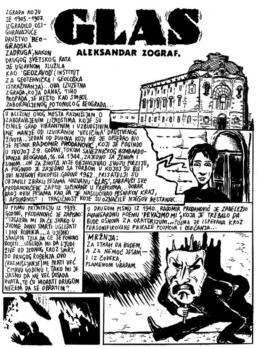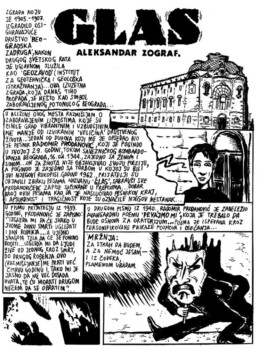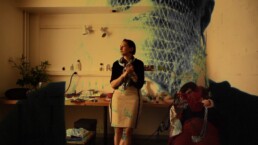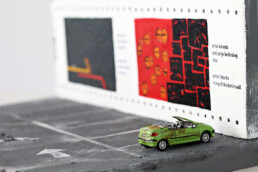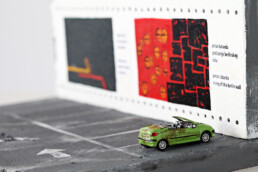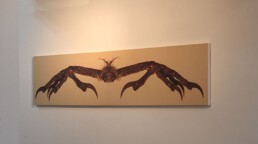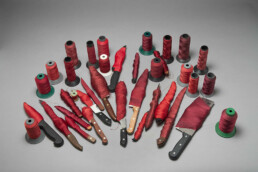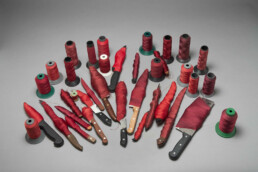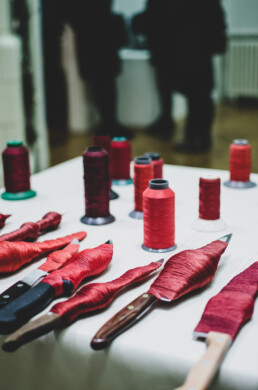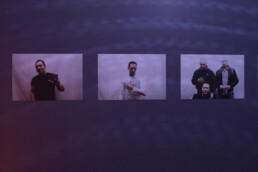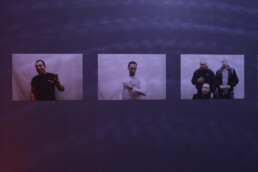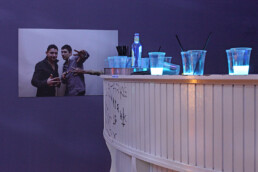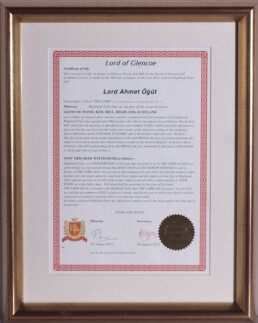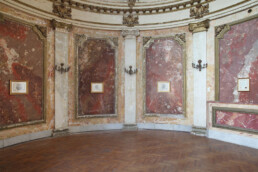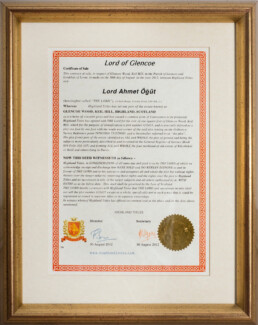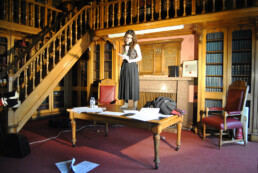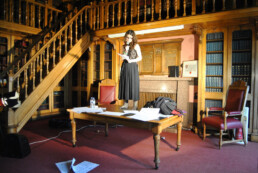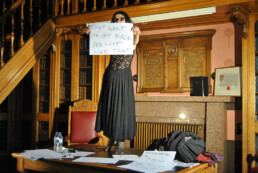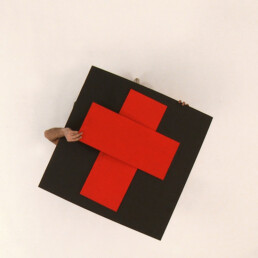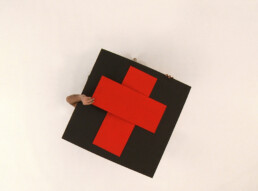Aleksandar Zograf
ALEKSANDAR ZOGRAF /
SAŠA RAKEZIĆ (1963)
Voice
comic book
2012
Voice
comic book
2012
The comic book Voice was created as a site-specific work within the 53rd October Salon (GOOD LIFE: Physical Narratives and Spatial Imaginations, 2012). The theme and location of that October Salon inspired the artist to take a look, in the introductory part of the book, into the Geozavod Building itself, which at that moment was a symbol of the forgotten and suppressed topos from the collective memory of the space from the beginning of the twentieth century. The plot of the comic book is directed towards two non-celebrated/forgotten writers.
As the main narrator, the artist briefly introduces us to the story of the Geozavod Building at the beginning, and then places the emphasis on two writers who worked outside the official elite social streams, which is why they remained anonymous, i.e., forgotten. One is Radomir Prodanović, who could have become an avant-garde poet and writer, and the other is R. Lenić, who wrote so-called entertaining literature in the 1930s. They are presented through excerpts from their oeuvre – Prodanović with his avant-garde epic poem Let Us Sing, and Lenić with an excerpt from her novel Gordana’s Love. Prodanović and Lenić wrote on different topics and in different styles. Zograf finds a connection between them in the fact that they both thought and wrote about basic human feelings and concepts such as love, hate, fear, hope. This is about the relationship between the vital force of creativity and the fact that it can be almost completely suppressed with the passage of time.
© Cultural Centre of Belgrade, October Salon Collection and the artist
Purchase Contract: III-5-180/14.6.2016.
Inventory No. 1418
Photo: Cultural Centre of Belgrade
Selected Bibliography:
53rd October Salon, Good Life: Physical Narratives and Spatial Imaginations. Cultural Centre of Belgrade, 2012
ABOUT THE AUTHOR:
Aleksandar Zograf (Saša Rakezić) (1963, Pančevo, Serbia) started publishing his comics in Yugoslav periodicals in 1986 – in the magazines NON, Ritam, Rock, Mladost. In the early 1990s, he began publishing more actively abroad, especially in America, in the magazines The Comics Journal, Zero Zero, Weirdo, Rare Bit Fiends, Buzzard, Bonus, Tantalizing Stories, The Stranger, New City. Fantagraphics Books published several of his titles: Life Under Sanctions, Psychonaut #1 and Psychonaut #2. Since 2003, the Belgrade weekly Vreme has regularly published two pages of his colour comics. He has participated in several international comics festivals, conferences and exhibitions. More information at http://www.aleksandarzograf.com/
Aurora Reinhard
AURORA REINHARD (1975)
Veus #2
inkjet print
variable dimensions
edition: 5
2016
Veus #2
inkjet print
variable dimensions
edition: 5
2016
The work is part of the installation Venus # 1 – # 3, which was exhibited at the 56th October Salon.
In the Venus Series 2014–2016, Reinhardt posed with commercial aids that simulate femininity – prosthetic breasts, face masks and rich wigs – the products intended mainly for transvestites, transsexuals and drag queens. Inconsistent with my maybe normative understanding of such clothing practices, it is obvious in these photographs that the person wearing these clothing accessories is a woman, (although it is not clear whether this is the artist herself). Through the process of filming, Reinhardt moves these products – mainly intended for men who would like to look like women – aside, and reveals how she wants to be seen and how this can awaken and strengthen her desire. Taking on the role of characters such as a pole dancer, she appears either naked or with barely covered large silicone breasts and then, in an extremely surprising setting, spreads her legs to expose a prosthetic penis – or in her words “the best of both worlds”. The Venus Series is not so much a critique of the way in which gender is constructed and reproduced, but it is a matter of complicated ways in which our desire (auto)directs itself and finds the form of its expression.
From the text by Marianne Mulvey, catalogue of the 56th October Salon
© Cultural Centre of Belgrade, October Salon Collection and the artist
Gift Contract: III-5-15/23.01.2018.
Inventory No. 109
Photo: Courtesy of the artist
ABOUT THE AUTHOR:
Aurora Reinhard (1975, Helsinki, Finland) graduated from the Academy of Fine Arts in Helsinki, Department of Time and Space Arts. She is known for her video works, photographs (self-portraits) and sculptures. She deals with topics related to gender and sexuality, moving between a documentary and surreal approach. Her works have been exhibited all over the world – at the History Museum in Berlin, Fridericianum in Berlin, Ludwig Museum in Budapest, Platform Garanti in Istanbul and others. The film Boygirl won the 2002 Award of the Year from the Centre for Art and Media in Karlsruhe, Germany. More information at https://aurorareinhard.com/
Marta Popivoda
MARTA POPIVODA (1982)
Talk to Him
video-work/installation
21’
2011
Talk to Him
video-work/installation
21’
2011
This video-work is about enjoyment, indulgence and touch (haptic images) that can occur between a film and its audience, or maybe it is just a story of unrequited, unnoticed love, slowly becoming torture over time.
She participated in the 49th and 51st October Salons.
The work is a result of an unusual collaboration or rather exchange between two artists, and therefore freed from the prescribed plans and expectations during the shooting. Marta Popivoda, the filmmaker “had received” the dance piece I Heart Lygia Clark by Jennifer Lacey, and immediately after, she shot the next performance in return. The dance piece itself addresses the idea of therapy as an artistic practice through a series of beauty treatments that the choreographer provides to each individual viewer. Raw material from this shooting is in possession of both authors and can end in very different films.
The video-work/installation Talk to Him by Marta Popivoda amplifies the multilayer performance, the performance for and with the spectator who doesn’t see it; the “backstage” performance between the three performers who – apart from executing the tasks that produce the sensorial event for the blind / dead spectator – perform their roles for one another; and the cinematic performance constructed by the camera eye. How to locate here the spectator’s eye, the point in which the set of actions, micro-events, and audio-visual sensations become performance? Is it about trust and confidence? In the search of the missing and shifting spectator’s eye, the film loses the sovereignty over its “object” and becomes a fragile affective experience, thus transmitting the sensuality of the performance to the film spectators.
Choreography: Jennifer Lacey, Audrey Gaisan, Barbara Manzetti
Performers: Nicolas Courtier, Jennifer Lacey, Audrey Gaisan, Barbara Manzetti
Copyright: Marta Popivoda
© Cultural Centre of Belgrade, October Salon Collection and the artist
Purchase Contract: III-5 -391/24.11.2016.
Inventory No. 1460
Photo: still from the video work
ABOUT THE AUTHOR:
Marta Popivoda (1982, Belgrade, Serbia) currently lives and works between Berlin and Belgrade. She works primarily in the field of moving images, at the boundary between visual art and film, exploring the discursive power structures of the contemporary world of art and cultural and political spheres of the former Yugoslavia through her films, video installations and performances. She is a member of the editorial collective of the TkH (Walking Theory), a theoretical-artistic platform and journal.
She has participated in exhibitions and programmes at important institutions such as: MoMA, New York; Tate Modern, London; M HKA, Antwerp; 21er Haus, Vienna; Beirut Art Center, Beirut; Musée de la dance, Ren; MSUM, Ljubljana; Arsenal, Berlin; La Casa Encendida, Madrid; Forum des Images and MK2 Beaubourg, Paris; Beursschouwburg and Kaaitheater, Brussels; Museum of Yugoslav History and Museum of Contemporary Art, Belgrade, etc. Her feature documentary Yugoslavia, How Ideology Moved Our Collective Body premiered at the 63rd Berlinale, and was later screened at many film festivals worldwide.
Popivoda is the initiator of the Illegal Cinema Project (Belgrade, Paris, Bilbao) and art director of REZ, contemporary experimental film festival in Belgrade. She graduated in film directing from the Faculty of Dramatic Arts in Belgrade and completed her post-graduate studies in experimental film at the Art and Media Study Programme of the Berlin University of Art (UdK). In 2014 she was selected for the Berlinale Talents Programme of the Berlin Film Festival, and in 2015 received a prestigious Art Prize of the City of Berlin for the visual arts from Akademie der Künste, awarded to a Serbian artist for the first time. In the same year she also received the Edith-Russ-Haus Award for Emerging Media Artists. More information at www.martapopivoda.info
Darinka Pop Mitić
DARINKA POP-MITIĆ (1975)
Educational Mural about Little-Known History of Painting
mixed media
31 cm x 13 cm x 14 cm
2013
Educational Mural about Little-Known History of Painting
mixed media
31 cm x 13 cm x 14 cm
2013
Educational Mural about Little-Known History of Painting by Darinka Pop Mitić is a reconstruction of her work presented at the jubilee 50th October Salon in 2009. It is, in fact, a reconstruction of a reconstruction and a logical continuation of the earlier work of this artist who deals with the relationship between history and memory in our (ex-Yugoslav) art space. Based on an alternative history, the artist offers us a passage into another past. In its original form, the work consisted of a series of six murals, painted on the sixth floor of the garage in Masarikova Street, at the place where the first October Salon was held far back in 1960. These murals were (un)realized paintings by famous local artists with clear political connotations related to the time and place of their (alleged) existence.
Aleksandra Estela Bjelica Mladenović
© Cultural Centre of Belgrade, October Salon Collection and the artist
Gift Contract: III-5-296/1/29.9.2014.
Inventory No. 1366
Photo: Milan Kralj
Selected Bibliography:
50th October Salon, Circumstance. Cultural Centre of Belgrade, 2009
ABOUT THE AUTHOR:
Darinka Pop-Mitić (1975, Belgrade, Srbia) studied at the Faculty of Fine Arts and the Faculty of Political Sciences. She has published texts in daily, weekly and theoretical publications and done several works in the public space. She lives and works in Belgrade
Her works are part of the collections of the Museum of Contemporary Art in Belgrade and Museum of Contemporary Art in Novi Sad. She participated in the 11th Istanbul Biennale, the 9th Guangzhou Biennale, the Nadežda Petrović Memorial, Arteast 2000+ exhibition in Moscow, etc.
Vladimir Perić
VLADIMIR PERIĆ (1962)
Palindromes
photograph on canvas
230 cm x 50 cm (2 pcs)
2009
Palindromes
photograph on canvas
230 cm x 50 cm (2 pcs)
2009
Vladimir Perić draws inspiration for his work mostly in his own environment and often uses discarded objects and fabrics found on flea markets, dumps, streets, and abandoned factories. Respecting the independent life of these objects and materials, as well as the traces of their existence and use over time, Perić transposes them into the art context as ready-mades, or as elements of installations, video works, graphics, photographs, etc. The resulting works have complex meanings, most often characterized by sharp criticism of the social environment, a humorous, lucid but also very personal, emotional language, often associated with the categories of memory – oblivion, childhood, private history.
The term palindrome is derived from two Greek words: palin (back) and dromos (way, direction), which literally means – “what flows backwards”. These are words, sentences and phrases that read the same backward and forward, for example: eye, kayak, nurses run, don’t nod. There are also typographic palindromes, e.g., the word “потоп” (Serbian word for deluge) written in the Cyrillic script, which is an example of perfect symmetry. It is on this principle that Vladimir Perić’s visual (photo) palindromes were created.
In the Palindromes Series, Perić reveals to us several aspects of his pluralistic, but certainly always recognizable, artistic expression. His interest in the culture and nature of the discarded and the displacement of “mere things” from their context and making them unusual through petty interventions is evident through the use and re-articulation of the collected specimens from wildlife. Perić draws our attention to the discarded “surplus materials” from nature, turning them into marks of an artistically built world, based on an almost boyish fascination with the wealth offered by all the specific qualities of different materials from our environment. With the sharpened perceptions of an artist-researcher-collector, Perić recognizes the potential of these objects and materials to transfer us, in an art context, from the everyday and usual into the field of diverse associations and reflections.
© Cultural Centre of Belgrade, October Salon Collection and the artist
Gift Contract: III-5-330/24.8.2016.
Inventory No. 087
Photo: Courtesy of the artist
Selected Bibliography:
48th October Salon, Micro-Narratives. Cultural Centre of Belgrade, 2007
56th October Salon, The Pleasure of Love. Cultural Centre of Belgrade, 2016
David Carson, 2nd Sight, Graphic Design after the End of Print, Universe Publishing, 1997
Stephen Heller, Mirko Ilić, Icons of Graphic Design, Themes & Hudson, 2001 (1st ed.), 2008 (2nd ed.)
Museum of Childhood, Memories Taken Over [author of the text: Slobodan Jovanović] Belgrade: Museum of Applied Art, 2009
Massimiliano Gioni, Natalie Bell, Il Palazzo Enciclopedico = the Encyclopedic Palace: Biennale Arte 2013, Venice, Italy: Marsilio Editori, 2013
Milena Dragićević Šešić, Art and the Culture of Resistance, Belgrade: CLIO, 2018
ABOUT THE AUTHOR:
Vladimir Perić (1962, Zemun, Serbia) is a multimedia artist, present on the local and international scene for over thirty years. For the first ten years (1986–1996), he appeared under the pseudonym Talent, then for the next ten years (1996–2006) worked and exhibited as the founder and member of the Talent Factory Group, after which he started the Museum of Childhood – conceived as another ten-year-long phase, but continued as a longer-term art-museum project. After his Talent Factory phase, the author has exhibited under his own name and surname and, since 2013, occasionally in tandem with Milica Perić, art historian, who joined him in the Museum of Childhood Project.
Perić has had more than eighty solo exhibitions and participated in over two hundred group exhibitions. He received the Politika Award from the Vladislav Ribnikar Fund for the best exhibition in 2005 (Made in Yu, Haos Gallery, Belgrade), and in 2013, together with Miloš Tomić, represented Serbia at the National Pavilion, 55th Venice Biennale. More information at http://www.vladimirperic.rs/
OLIVERA PARLIĆ KARAJANKOVIĆ
OLIVERA PARLIĆ KARAJANKOVIĆ (1971)
Threadwork
group of objects on the table, artificial leather, spools of filament thread, 20 knives
90 cm x 120 cm x 70 cm
2008–2012
Threadwork
group of objects on the table, artificial leather, spools of filament thread, 20 knives
90 cm x 120 cm x 70 cm
2008–2012
“The work Threadwork is an attempt to answer the questions of what I am doing; what we, people, are doing; whether there is a common determinant of our activities, and what is the most important one; how to explain yourself to yourself, but also to others through what you do. The common denominator of these activities most often is their neurotic character: endless repetition of unsuccessful, meaningless procedures. It is not a novelty that something is wrong in the world and that we are involved in multiplying these errors.”
She participated in the 44th and 55th October Salons.
“The installation consists of a large number of knives whose blades are wrapped in numerous layers of red thread in various shades of red. The layers of thread are thick, sometimes covering the entire knife, not just the blade, becoming autonomous abstract forms that remain attached to the spools. Here and there, a pair of knives is tied together with red threads, revealing their relationship to us. We are witnessing an interrupted process, as if what is essential has already taken place, and we only see the traces of the event: an unusual collection of instruments for needlework. The ambivalence of the forms and relationships makes it impossible to determine the direction in which this process takes place: whether the blades are being uncovered and returned to their purpose, or it is about nullifying the function of the blade. There is no correct answer. The surface of the table with objects placed on it is like a stage left by the participants after the play. The resulting objects are merely a consequence; the performative process that preceded it is the focus of the work. The function of the objects and their usefulness are pushed aside in favour of a pure aesthetic experience, but they still speak: a tool, a knife blade, it is always a challenge to act against.
The process through which I came to the form of the objects in this work was long and delicate. The winding/unwinding movements often bring the blade dangerously near to the skin; injuries are inevitable, and yet I am not giving up. The movements are almost hypnotic and ritualistic, seductive and dangerous, though repetitive, they are never mechanical; they are always performed in deep concentration. These are my two hands: one precisely draws a delicate tissue with a red thread and the other, armed with a knife, sometimes makes a drawing on the back of my hand, with the blade. And although the resulting objects point to the process, they tell us little about the risk to which the hand was exposed; the beauty of the functionless object remains as a trace.”
Olivera Parlić Karajanković
© Cultural Centre of Belgrade, October Salon Collection and the artist
Purchase Contract: III-5-382/16.11.2016.
Inventory No. 1450
Photo: Courtesy the artist, installation view Pančevo, Tanja Drobnjak
ABOUT THE AUTHOR:
Olivera Parlić Karajanković (1971, Belgrade, Serbia) graduated in sculpture (1997) and received a master’s degree (2000) from the Faculty of Fine Arts in Belgrade. In 2014 she earned a doctoral degree from the Faculty of Fine Arts in Belgrade for her art project The Eros of Impossible Encounters, a sculptural form of objectified feelings. In 2005 she started working as an assistant lecturer at the Sculpture Department of the Faculty of Fine Arts and currently is an assistant professor.
Since 1997 she has presented her work in the country and abroad at numerous solo exhibitions and at the October Salon (in 2003 and 2005). She took part in the project (Out) of the Styria Institute for Art in Public Spaces, Graz, Austria, within the Styria Autumn 2009; her work was included in the exhibition A Journey Through Contemporary Serbian Art, at the China Art Museum in Shanghai in 2017. She participated in residency programmes in Ečka and Jalovik, the Terra International Art Colony in Kikinda, Air Hotel Pupik in Austria, Ada Sculpture Colonies on Ada Ciganlija, art colonies in Sićevo and Vlasina, Marble and Sounds Art Festival.
Her sculpture Čun-Pun is placed in the public space on Ada Ciganlija. She won the FLU Award for Portrait and the Sreten Stojanović Award for sculpture.
A significant part of her work has been realized within the Third Belgrade Independent Art Association, since its foundation in 2010.
Andrea Palašti
ANDREA PALAŠTI (1984)
Balkan Disco
12 photographs
70 cm x 100 cm
2010–2012
Balkan Disco
12 photographs
70 cm x 100 cm
2010–2012
The work was presented as a spatial installation at the 54th October Salon in 2013, in the building of the former Kluz Department Store, 4 Masarikova St. in Belgrade. All the photographs were taken at the “Balkan” Disco in Vicenza in 2010. This disco-installation was an incorporation of a nightclub into the concept of an exhibition. She also participated in the 55th October Salon, Disappearing Things, 2014.
The title was borrowed from one of the numerous nightclubs bearing the name “Balkan” (e.g., Balkan Disco in Vicenza, Italy; Balkan Disco Express in Vienna, Austria; Balkan Night in Hamburg, Germany), where the “Balkan” music – traditional turbo-folk – is played. In the 1990s, turbo-folk music had a key role in defining the Serbian social and national identity. By recontextualizing the disco within the art space, the work becomes a kind of ready-made, thus examining the boundaries of aesthetics and ethics, geography and geopolitics, as well as everyday life and artificial artworks. In this light, the Balkans ceases to be a geographical and becomes a cultural determinant: today, the Balkans is becoming a stereotypical marker of a place for having a good time.
The spatial installation exhibited at the 54th October Salon included 13 photographs lined on alubond, a neon lighting, disco ball, bar, bar stools, gin-tonic, waitress.
© Cultural Centre of Belgrade, October Salon Collection and the artist
Gift Contract: III-5-287/ 22.9.2014.
Inventory No. 1347
Photo: installation view 54th October Salon, Ana Kostić
Selected Bibliography:
54th October Salon, No One Belongs Here More Than You. Cultural Centre of Belgrade, 2013
ABOUT THE AUTHOR:
Andrea Palašti (1984, Novi Sad, Serbia) in her art practice focuses on the issues of cultural geography, history and everyday life. She graduated in photography from the Academy of Arts in Novi Sad. In 2015 she received her academic title of Doctor of Science in Arts and Media from the Belgrade University of Arts, the Group for Theory of Arts and Media of the Interdisciplinary Doctoral Studies. She is the winner of the 54th October Salon in Belgrade (2013), as well as the Iskra Kultura Award, given by the Vojvodina Institute of Culture (2016). As part of the research fellowship from the Institute for Contemporary History, she spent some time at the photographic archive of the Federal Archives (Berlin / Koblenz, Germany), the Wiener Library (London, England) and the US Holocaust Memorial Museum. The kültüř gemma! Foundation and the Ministry of Culture of the City of Vienna granted her a fellowship in 2018, for a research project carried out in collaboration with the National Museum in Vienna, dealing with the study of private photographs taken during the Second World War.
Together with Srđan Keča, she collaborated with the team of authors of the exhibition project 14-14, which represented the Republic of Serbia at the 14th Venice Biennale of Architecture in 2014. Currently, she works as an assistant professor at the Academy of Arts in Novi Sad, on the subject of Visual Elements, Department of New Media Art. More information at www.andreapalasti.com
Ahmet ÖGÜT
AHMET ÖĞÜT (1981)
Things You Think You Can Buy with Money
A deed of one square foot of land in the Glencoe Wood in Scotland
20 cm x 30 cm
2012
Things You Think You Can Buy with Money
A deed of one square foot of land in the Glencoe Wood in Scotland
20 cm x 30 cm
2012
The work was produced for the 53rd October Salon, Good Life. Certificates and other documents collected and framed by the author prove his ownership over 100m2 of land on the Moon, one square foot in the Caribbean and another in the Glencoe Wood in Scotland.
© Cultural Centre of Belgrade, the October Salon Collection and the artist
Gift Contract: III-5-288/23.9.2014.
Inventory No. 1348
Photo: Milan Kralj, installation view 53rd October Salon, Ana Kostić
ABOUT THE AUTHOR:
Ahmet Öğüt (1981, Diyarbakir, Turkey) lives and works between Amsterdam and Berlin.
He is the founder of the Silent University. www.thesilentuniversity.com
As a conceptual artist, he uses a variety of media (video, photography, drawing, installation, performance), and through his works he reveals political, economic and state control over the way people in different parts of the world experience everyday life.
He won the Volkskrant Visual Arts Prize in 2011. Together with Banu Cennetoğlu, he represented Turkey at the Venice Biennale in 2009. He has participated in numerous exhibitions, biennials and film festivals around the world. More information at www.ahmetogut.com
Tanja Ostojić
TANjA OSTOJIĆ (1972)
Naked Life 6
single-channel DV video-performance, colour, sound, PAL
the original video-work is in English, with subtitles in English
50’15”
edition: 1/15 + 1 a.c.
2016
Naked Life 6
single-channel DV video-performance, colour, sound, PAL
the original video-work is in English, with subtitles in English
50’15”
edition: 1/15 + 1 a.c.
2016
This is the final work, culminating in the entire series, with an extremely strong emotional charge, which had an emancipatory, transformative and healing effect on the viewers and the ensuing discussion. This 50-minute video by Tanja Ostojić is a recording of the eponymous political striptease show, performed on a table in the packed hall of the famous Aberdeen Bar Association in, Scotland on March 12, 2016.
It was realized in the best tradition of the video-performance Naked Life 1 (2004 – which was well received at the October Salon in Belgrade), Naked Life 2 (2011 – performed at the Venice Biennale, the Roma Pavilion in the UNESCO building) and Naked Life 4, (2015 in Gothenburg, referring to 500 years of systematic discrimination against Roma in Sweden). All these works are based on the artist’s research, on the reports of the European Roma Rights Centre and many other international Roma organizations, and they deal with different types of discrimination against Roma, racism and violation of their human rights, women’s rights and children’s rights.
The interdisciplinary work Naked Life explores individual cases and history of discrimination against the largest minority groups in Europe, Roma and Sinti. The project gets to grips with “naked life”, social and political exclusion, deportation, racism, biopolitics, xenophobia and different cultural identities. In her most recent video performance, the artist reads aloud portions of interviews about the tragic destinies of young Roma women and men who were deported from Germany and France to Serbia and Kosovo, although some of them had previously lived in Western Europe to the age of twenty-two… These deportations are the result of declaring the Balkan countries “safe countries”, although they are actually not safe for the Roma, especially when it comes to Kosovo, where the conditions for their employment, education and progress are almost zero. In this performance, Ostojić also addresses the most relevant recent cases of racism against Roma in the UK.
In the pauses of reading, she slowly takes off her many dresses and blouses and eventually remains completely naked and symbolically vulnerable as “naked life”. The intensity of the performance is dramatically enhanced every time the artist bangs the table with the heel, in the courtroom where many important acts have been debated for centuries. Through this process, she emphasizes the gravity of the situation and expresses her protest over it.
She writes the authentic words of some of the interviewed artists on sheets of paper and serves them to the audience. Ostojić wonders how it is possible at all in modern Europe that certain ethnic groups are systematically excluded and deprived of political, social and human rights.
“It’s time to put an end to the last allowed racism – racism against the Roma!” Mar. 25, 2016
Production: Gray School of Art / Robert Gordon University, University of Aberdeen, Scottish Cultural Art Network, Society of Advocates Hall
Performer: Tanja Ostojić
Copyright: Tanja Ostojić
© Cultural Centre of Belgrade, October Salon Collection and the artist
Purchase Contract: III-5-407/12.12.2016.
Inventory No. 1461
Photo: still from the video work
Selected Bibliography:
Video interview with Tanja Ostojić, with video and photo review of some of her most important works, Directors Cut, Aberdeen, Scotland, May 2015:
http://cdnapi.kaltura.com/index.php/extwidget/openGraph/wid/1_hdyspejd
Interview with Tanja Ostojić, Slought Foundation, New York:
https://slought.org/blog_posts/marriage_and_other_migrations
Misplaced Women? http://misplacedwomen.wordpress.com
ABOUT THE AUTHOR:
Tanja Ostojić (1972, Užice, Serbia) graduated in 1995 and received her master’s degree in 1998 from the Sculpture Department of the Faculty of Fine Arts in Belgrade. In the period 1998-1999 she attended the international post-graduate programme at the Academy of Fine Arts in Nantes, France, and in 2012–2014 received a research fellowship and continued her studies at the University of the Arts in Berlin / Fellow GS UdK.
As an interdisciplinary artist, she actively creates and exhibits in Europe and around the world. Since 1992, she has participated in several hundred group exhibitions, video, film, theatre and performance festivals, and in 1995 started presenting her works at solo exhibitions. In 1996 she became a member of ULUS (Association of Fine Artists of Serbia). She is a member of the Remont Founding Board and the founder of the international art groups XPONA and Art & Economics Group.
As a visiting professor, she has held lectures, workshops and seminars at many universities across the world.
Over the past 20 years, she has carried out a great number of notable performances, including those at the main exhibition of the 49th Venice Biennale (2001), Roma Pavilion at the 54th Venice Biennale (2011), ICA Institute of Contemporary Art in London (1999), Performa in New York, Ludwig Museum in Budapest, Museum of Contemporary Art in Belgrade, HKW in Berlin, Kaiteater in Brussels, DieTheater Konzerthaus spiel: platz Theater in Vienna, Kampnagel Theatre in Hamburg, Brecht Literatur Festival in Augsburg , PSi Conference in Zagreb, TQW in Vienna, Re.act.feminism in Berlin, Kunstverein NRWF in Dusseldorf, Hollywood Leather in London, Student Cultural Centre in Belgrade, Youth Biennial in Vršac…
Her works are part of many collections, some of which are: MSUB Museum of Contemporary Art, Belgrade; MSUM Museum of Contemporary Art Metelkova, Ljubljana; MAK, Museum of Applied Arts, Vienna; Pedagogical Museum Belgrade; Contact – Erste Bank Collection, Vienna; TERRA Museum, Kikinda; Danilovgrad City Park, Montenegro (sculpture in public space); , NBK, Neuer Berliner Kunstverain; Video Forum, Berlin; e- FLUX: New York / MSUM Ljubljana, Feminale archive / Bildwechsel Women’s Film Archives, Hamburg,
re.act.feminism, Berlin, Danesch & Rych, Minority Logbox, Thyssen-Bornemisza Art Contemporary, Vienna.
Vladimir Nikolić
VLADIMIR NIKOLIĆ (1974)
Painting
video
11’11”
edition: 5 + 2 a.c.
2009
The End of the World
video
1’34”
2013
Painting
video
11’11”
edition: 5 + 2 a.c.
2009
Painting belongs to the Voice Over Series, along with the video works Land Art, Performance, Installation and the photographs Paintings. The main protagonists in the video work are the painting and the artist, who, through a short performance, opens the question of the position of the artist/author in the overall structure of the art system.
“Only after watching this video does Nikolić’s intention become clear: if the art system by its whole constitution aims to make the artist its clerk, then a critical artist must first auto-reflexively bring this function into question in order to define their own speaking position. It’s not about whether the artist is for or against the institution, says Andrea Fraser in her well-known essay on institutional critique, but whether they have a consciousness of their own role in the perpetuation of its positions, and which values they interiorize through the work of their ‘inner curator’ so they wouldn’t become a court jester that is expected to say whatever they want and be rewarded for it. Therefore the cutting edge of Nikolić’s cynical intervention is not turned towards the institution but towards the artist-clerk, in other words towards their ‘correct false consciousness’ (K. Marx) that, as demonstrated by the experience of conceptual art, even in the resistance toward the authority confirms the accuracy of the illusion that this authority can be disputed. The repetition of conceptual forms of expression and appropriation of modern painting do not put to the test only the notions of new and diversity that Groys theorizes about, but establish historical relays for actual analysing of the ambivalent status of the artist within art as both the subject and object of the production of aesthetic contents.”
Dejan Sretenović, the catalogue of the exhibition Voice Over, Museum of Contemporary Art Belgrade
© Cultural Centre of Belgrade, the October Salon Collection and the artist
Gift Contract: III-5-219/14.8.2014.
Inventory No. 1333
Photo: still from the video work
Selected Bibliography:
50th October Salon, Circumstance. Cultural Centre of Belgrade, 2009
Vladan Nikolić: Voice-Over, text by Dejan Sretenović for the solo exhibition, Salon of the Museum of Contemporary Art Belgrade, 2009
Jasmina Čubrilo, “Aporija autonomije i heteronomije savremene umetnosti: For the sake of humanity – let art be more ‘arty’”, Nova povezivanja. Od scene do mreže, Faculty for Media and Communication, Belgrade, Artprint, Novi Sad, 2017, 153–167
The End of the World
video
1’34”
2013
The video follows the formation of the image in the image, created by arranging parts of a mirror. It belongs to the Mirrors Series, which problematize the interspace between the eye and reality, the immediate bodily experience in perception.
The Mirrors Series was created in the period between 2011 and 2013 and consists of Reclining Nude, Portrait of Mauro Romito, Portrait of Filippo Riniolo, Train Passing, An Act in Space and The End of the World. Before we see a certain scene, all the works follow and show the process of creation, that is, the work of the artist, who, respecting technical procedures and protocols, diverts attention from the discursive nature of the image/perception to its methods, specificities, i.e., to some of the elements through which its substance/autonomy can be determined and proved.
© Cultural Centre of Belgrade, the October Salon Collection and the artist
Purchase Contract: III-5-478/1/15.12.2014.
Inventory No. 1396
Photo: still from the video work
Selected Bibliography:
Vladimir Nikolić: The End of the World, solo exhibition, Podroom Gallery, Cultural Centre of Belgrade, 2014
ABOUT THE AUTHOR:
Vladimir Nikolić (1974, Belgrade, Serbia) graduated and received his doctorate from the Faculty of Fine Arts in Belgrade. He works primarily in the field of video art. In his works, Nikolić explores the mechanisms of ritual submission to the authority of religion, tradition and art history. He also deals with institutional critique, i.e., the role of the artist in the system in which they act, and the role of images in contemporary modes of visual perception. Nikolić has presented his work at numerous solo and group exhibitions in the country and abroad, and participated in international art residency programmes such as Foundation for a Civil Society (New York, 2003), Recollets (Paris, 2007), Otto Prod (Marseille, 2008), 24cc (Rome, 2011), Times Museum (Guangzhou, 2014), IASPIS (Stockholm, 2016), Tobačna 001 (Ljubljana, 2017). He has won several awards, including the Dimitrije Bašičević Mangelos Award in 2003 and the 50th October Salon Award in 2009. His works are part of several public and private collections: the collection of the Museum of Contemporary Art in Belgrade, Centre Georges Pompidou in Paris, Berardo Museum in Lisbon, the FRAC Collection in Angoulême, France, Vehbi Koç in Istanbul, etc. Lives and works in Belgrade; currently an assistant professor at the Faculty of Fine Arts. More information at www.vladimir-nikolic.com
